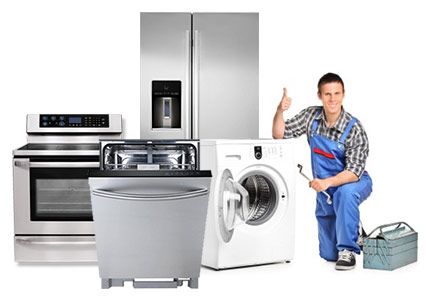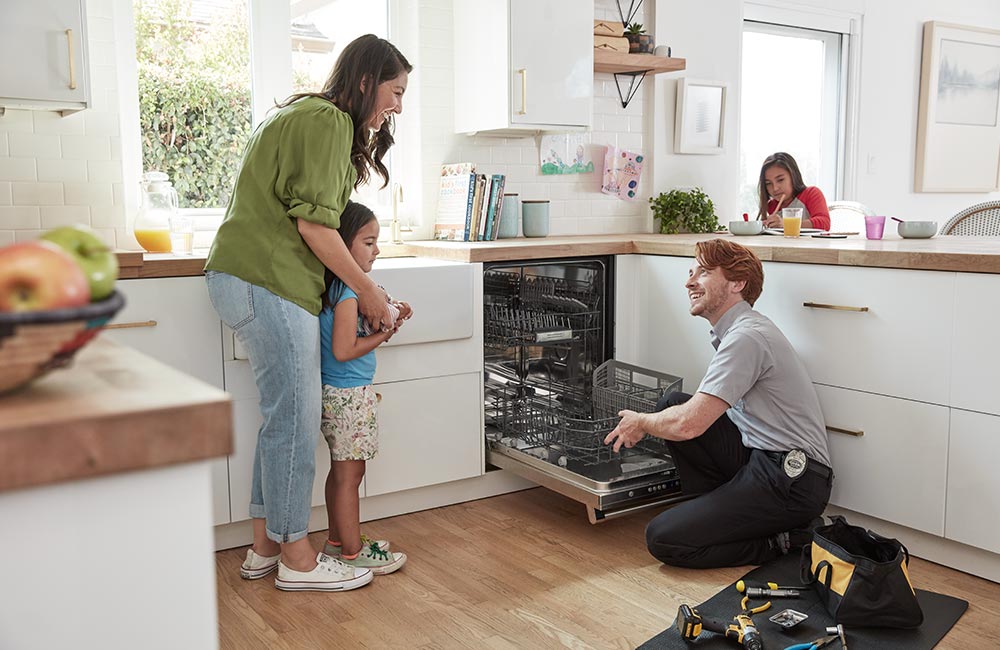The Ultimate Guide to Comprehending Home Appliance Repair Service at Home
When your refrigerator stops cooling down or your oven rejects to warmth, it can feel overwhelming. Understanding home appliance repair in the house can conserve you time and money. You'll discover to recognize signs and symptoms, use crucial tools, and adhere to an organized troubleshooting procedure. But before you start, there are critical safety precautions you need to take into consideration. What are one of the most typical problems, and exactly how can you fix them? Allow's explore the basics.
Usual Device Troubles and Their Signs
When your devices start acting up, it's vital to acknowledge the indications at an early stage. Overlooking them can lead to bigger concerns and costly fixings. If your refrigerator isn't cooling correctly, you could see warm places or condensation forming. This can suggest a falling short compressor or an obstructed vent.Your dish washer may reveal issues with unclean meals or uncommon noises throughout cycles. If you listen to grinding or clanking, it's time to investigate.A washing device that won't spin or drain pipes can leave you with soaked washing, recommending a clogged drain or a malfunctioning pump.Lastly, if your stove's temperature appears off or it takes for life to pre-heat, you may be handling a defective thermostat. By staying alert to these signs and symptoms, you can resolve issues before they rise right into major fixings.
Necessary Tools for Device Repair Work
When you're taking on appliance repairs in your home, having the right tools is necessary. Fundamental hand tools like screwdrivers and pliers will certainly aid you dismantle and take care of numerous appliances, while electrical screening devices guarantee you're working safely with wiring. Allow's look at what you need to begin on your repair journey.
Basic Hand Tools
Having the right tools is crucial for efficient device repair service at home. Beginning with a reliable screwdriver set, including both flathead and Phillips types, as screws prevail in home appliance setting up. Pliers are likewise vital; they aid with gripping, turning, and reducing cords or tiny elements. A pair of needle-nose pliers can get to limited spots quickly. You'll require a great flexible wrench for tightening or loosening up nuts and bolts. An utility knife comes in handy for puncturing packaging or insulation. Finally, do not fail to remember a sturdy workbench or surface area to safely arrange your devices and parts. With these fundamental hand devices, you'll be well-prepared to take on most device repair work that come your way.
Electric Testing Instruments
Alongside fundamental hand devices, electric screening tools play a necessary duty in appliance repair work. These devices assist you diagnose electrical issues and warranty appliances work securely. A multimeter is vital; it measures voltage, current, and resistance, permitting you to pinpoint issues promptly. A non-contact voltage tester is another must-have, allowing you detect live cords without making direct get in touch with, enhancing your safety. Clamp meters are fantastic for measuring present flow in wires without detaching them, saving you effort and time. In addition, circuit testers can rapidly examine if outlets are functioning appropriately. By utilizing these gadgets, you'll streamline your troubleshooting process and improve your fixing abilities, making home appliance maintenance a great deal easier.
Step-by-Step Overview to Diagnosing Home Appliance Issues
When your appliance breaks down, it can be irritating, however diagnosing the issue does not have to be overwhelming. You'll discover to determine usual troubles and apply efficient repairing techniques. Let's go through the actions to get your appliance back in functioning order.
Usual Device Problems

Repairing Techniques Discussed

Fixing Significant Kitchen Area Home Appliances: A Closer Look
Have you ever before asked yourself how to deal with usual issues with your cooking area appliances? Fixing significant kitchen devices like fridges, stoves, and dish washers can be simpler than you assume. Begin by determining the problem-- whether it's a fridge not cooling or a stove that will not heat. Usually, a simple reset or examining the power source can resolve the issue.For refrigerators, tidy the condenser coils and examine the door seals. If your stove's not home heating, evaluate the burner and thermostat. Dishwashers could just require a clean filter or a reset to get them back in activity. Constantly disconnect the device before diving right into repair services to guarantee your safety.Don' t forget to consult the individual manual for particular fixing pointers associated with your model. With a bit of perseverance and the right devices, you can with confidence deal with appliance repair work and save cash at the same time!

Repairing Laundry Equipments: Tips and Techniques
When your laundry appliances begin breaking down, it can feel frustrating, but troubleshooting them does not have to be a hassle. Start by inspecting the power supply. Confirm the device is connected in and the outlet is functioning. Next, examine the door or cover button; a malfunctioning button can protect against the device from operating.For washers, if it's not rotating, look for out of balance lots. Rearranging the clothing may resolve the issue. If your clothes dryer isn't home heating, clean the dust filter and examine the air vent for blockages.Listen for uncommon sounds; they can show a problem. If your home appliance is leaking, check the tubes for splits or loosened connections. Document any kind of mistake codes displayed on digital screens, as they can lead you in determining the problem. Speak with the user guidebook for specific repairing tips related to your design.
Security Preventative Measures to Take During Fixes
Before you begin any device repairs, it's necessary to focus on safety to avoid accidents or injuries. Initially, unplug the home appliance or shut off the circuit breaker to guarantee no power reaches it while you function. Usage insulated devices to decrease the danger of electrical shock. Put on safety goggles and gloves to safeguard yourself from sharp edges or debris (Dependable Refrigeration & Appliance Repair Service Dryer repair near me).Make specific your work space is neat and well-lit, so you can see what you're doing. Maintain kids and animals away from the area to prevent distractions and possible dangers. If you're handling gas appliances, be added careful; check for leaks prior to proceeding.Take your time, and do not rush through repair work. If you really feel uncertain regarding any kind of action, it's much better to stop and research study than to think. Adhering to these preventative measures will help produce a more secure environment for your do it yourself device repair job
When to Call an Expert for Help
How do you recognize if it's time to employ a specialist for device repair work? If you have actually tried basic troubleshooting without success, it's a clear indicator. For circumstances, if your appliance still won't begin or reveals unusual sounds after resetting it, don't wait to look for professional help.When you discover leaks, smoke, or shedding smells, focus on security and call a pro immediately. These concerns can cause more considerable damages or present risks to your home.Also, if your appliance is under service warranty, contacting a specialist is usually the most effective route. They can assure that repairs won't invalidate your guarantee, conserving you money in the long run.Finally, if you're uncertain or uncomfortable with complex repair work, it's important to leave it to the specialists. Keep in mind, dealing with complicated issues without the right experience can lead to pricey errors. Trust a specialist when in question!
Regularly Asked Questions
How Can I Stop Home Appliance Problems in the Future?
To protect against appliance troubles in the future, you should carry out regular maintenance, check for wear and tear, tidy filters, and stay clear of overloading. Staying proactive will help expand their lifespan and keep them running efficiently.
What Are one of the most Usual Do It Yourself Home Appliance Repair Service Mistakes?
You could ignore safety preventative measures, avoid troubleshooting steps, or make use of inaccurate tools when attempting DIY appliance repair services. Rushing the process or ignoring supplier guidelines can cause more significant concerns and pricey blunders. Remain patient and educated!
Exactly how Do I Know if a Component Demands Substitute?
You can tell if a part requires replacement by inspecting for uncommon noises, leaks, or irregular performance. If the home appliance struggles to operate appropriately or shows visible damages, it's most likely time for a replacement.
Can I Utilize Generic Parts for Home Appliance Repairs?
Yes, you can use common parts blender repair near me for home appliance fixings, yet ascertain they work - Kenmore Dryer Repair Oro Valley Dependable Refrigeration & Appliance Repair Service. Generic components could save you money, yet they could affect efficiency or longevity, so consider your alternatives meticulously before choosing
What Warranties Cover Home Appliance Services?
The majority of device guarantees cover repair services for making issues, however they typically leave out damages from misuse. Inspect your guarantee terms thoroughly, as some could need utilizing certified specialists and original components for protection to continue to be valid.